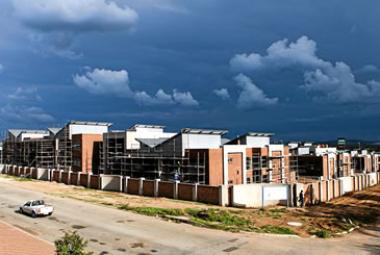Treasury defends allegations over Limpopo property deal
 The R300-million building in Polokwane that has caused an uproar. (Brett Steele) - Mail & Guardian
The R300-million building in Polokwane that has caused an uproar. (Brett Steele) - Mail & Guardian
Pretoria - The decision to buy a property in Limpopo did not require the prior approval of the provincial legislature and therefore the deal does not constitute a violation of the Public Finance Management Act (PFMA).
This was a response from National Treasury and the Department of Health on allegations that National Treasury endorsed the purchase of a property in Limpopo for more than its value.
According to the article in the Mail & Guardian today, “Limpopo up in arms over property deal”, accuses National Treasury of endorsing the purchase of a property in Limpopo for a lot more than what the property is worth and that the deal was not approved by the provincial legislature.
In a joint statement from National Treasury and Health Department it was explained that long before the national government intervened in the province in December 2011, the Limpopo Department of Public Works issued a tender for the construction and lease to the provincial government of a residential property for doctors.
The contract was awarded by the provincial Public Works Department and the provincial Health Department, then entered into a lease agreement with Promafco.
“Included in the lease agreement was a clause giving the provincial Department of Health an option to buy the property from Promafco. The purchase of the property was done in terms of this clause and therefore it would have been illogical to issue a tender when government was exercising its right as per the lease agreement.
“Contrary to what sources have told the Mail & Guardian, the decision to buy the property did not require the prior approval of the provincial legislature and therefore the deal does not therefore constitute a violation of the Public Finance Management Act (PFMA),” the statement said.
The statement further noted that at the request of the property developer, the Minister of Health, who in terms of the Section 100 (1) (b) of the Constitution is the MEC for Health in Limpopo, asked the Minister of Finance (in his capacity as the MEC for Finance) to approve the lease in terms of section 66 of the PFMA.
“Such approval was asked for by a financial institution that wanted to finance the developer on condition he had proof that the property deal was indeed legal, especially after the national government intervention. The Minister of Finance recommended that a technical team made up of the national Department of Health and consulting engineers be mandated to evaluate the project and propose whether the province should continue with the lease or buy the building as per lease agreement.”
After an evaluation, the statement continued, the provincial and the national Departments of Health together with external consulting engineers concluded that it would be in the best interest of government to buy the building and “based on this report, National Treasury endorsed the deal”.
The evaluation showed that the rental rate of return of the lease was higher than the industry norm. The rental also had an escalation of 9% per year, which was deemed to be fairly high.
“By year 10, the rental per month would have increased to R4.5 million (excluding VAT) and this would have brought the total rental paid over the lease period to more than R400 million, and government would still not own the property at the end of the lease period. Taking all of these factors into account, government came to the conclusion that it would be in its best interest to buy the building,” the statement explained.
The buy-out clauses in the lease agreement outline a formula for determining a fair purchase price. Applying this formula a purchase price of R359 million (excluding VAT) was derived and this was subsequently revised down to R328 million (excluding VAT).
Subsequently, the National Department of Health and National Treasury negotiated the price down to R298 million (excluding VAT), a price which consulting engineers said was fair.
Funds for the purchase of the building were secured without hampering the delivery of other core health services. National Treasury asked the National and Provincial Departments of Health to ensure that they had funding in place before entering into the purchase agreement.
The statement noted that after careful assessment of the state of finances of the province, the provincial treasury, through the administrator, gave the provincial department of health the go-ahead to buy the property. By the time the lease agreement was signed the province’s financial position had improved significantly.
“As of yesterday [Thursday], the province had cash of R2.3 billion in its account before further transfers to the province by national government. Compare this with the overdraft of over R700 million during the same period last year, on top of which the province was seeking an additional R1 billion. The cash balance excludes the R298 million (excluding VAT) already set aside for the purchase of the building.
“The cash position of the province has improved to such an extent that the provincial department of health was allocated a further R88 million to refurbish the entire boiler systems of hospitals in Limpopo. These boilers were not properly maintained and were damaged prior to the intervention, in addition, a further R50 million will be used by the provincial department of health for the procurement of auto claves (theatre sterilisation equipment) for hospitals that were not put in place by the department prior to the intervention. So, money is no longer a problem in the province,” the statement read.
In terms of the Deed of Sale entered into between the developer and the provincial department of health, the developer will only be paid once all conditions have been met, including the lodging of the property with the Deeds Office for transfer to government. So, the developer has not been paid a cent and the money is in a trust account, as is normal with transactions of this nature.


















